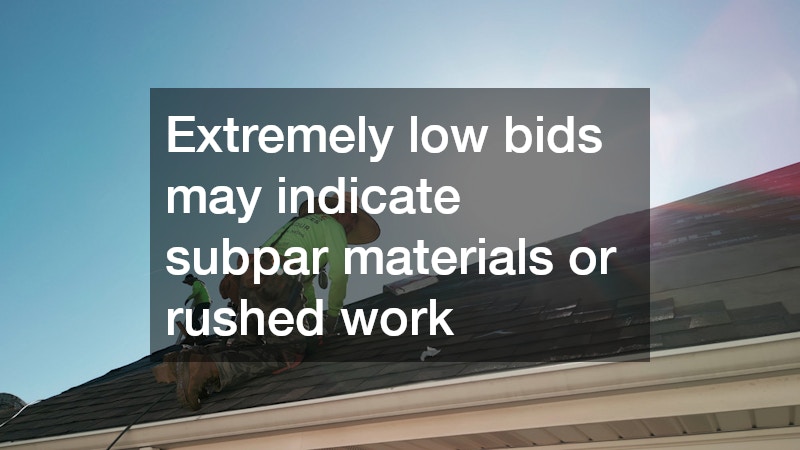Key Takeaways
-
Read and compare roofer quotes carefully to understand labor, materials, and additional costs.
-
Ensure each quote is fully itemized and transparent, including permits, disposal, and warranties.
-
Compare multiple quotes side-by-side for materials, labor, timeline, and optional services.
-
Evaluate material quality, brand, and manufacturer warranties for long-term durability.
-
Assess labor costs considering crew experience, project complexity, and local rates.
-
Ask contractors clear questions about hidden fees, payment structure, and references.
-
Watch for red flags like vague quotes, extremely low bids, or unlicensed contractors.
Hiring a roofing contractor is one of the most important home improvement decisions a homeowner can make. The roof protects your home from weather, water damage, and structural problems, and a poor roofing job can lead to costly repairs or early replacement. One of the first steps in selecting a contractor is obtaining a roofer quote—a document that outlines the expected costs, materials, and services for a roofing project.
Unfortunately, reading and comparing roofer quotes can be confusing for many homeowners. Quotes vary in format, terminology, and level of detail, making it difficult to know which one represents the best value. Misinterpreting a quote can result in unexpected expenses, delays, or subpar work.
This article provides a comprehensive guide to understanding roofer quotes, breaking down line items, comparing multiple estimates, evaluating labor and materials, identifying hidden costs, and asking the right questions. By the end, you’ll have the knowledge to make informed decisions and hire a contractor with confidence.
Understanding the Basics of a Roofer Quote
A roofer quote is an official document provided by a roofing contractor that details the expected cost of a project, including labor, materials, and other associated fees. While similar to estimates or bids, quotes are usually more formal and may include warranties or guarantees. Understanding the basic components of a roofer quote is crucial for comparing multiple offers.
Typical components of a roofer quote include:
-
Labor costs: The contractor’s pricing for crew hours, project management, and specialized work such as flashing or ventilation installation.
-
Material costs: Pricing for shingles, underlayment, flashing, nails, fasteners, and other supplies. Materials may be listed by brand, type, and quantity.
-
Permit and inspection fees: Some projects require city or county permits and inspections, which can be included in the quote.
-
Waste disposal fees: Dumpster or hauling charges for old shingles and construction debris.
-
Warranty details: Coverage for materials and labor, including duration and conditions.
-
Additional services: Optional upgrades like enhanced ventilation, gutter replacement, or roof decking repairs.
By understanding these components, homeowners can identify what is included in each quote and spot any missing items that could result in additional costs later.
Breaking Down Line Items
Roofer quotes often contain line items that may appear confusing or vague to homeowners. Carefully reviewing each item is key to knowing exactly what you are paying for.
Checklist for reading line items effectively:
-
Materials: Verify the type, quantity, and brand of roofing materials. For example, ensure that a quote listing “asphalt shingles” specifies the manufacturer, style, and warranty.
-
Labor: Check the estimated hours and number of workers assigned to your project. Understand whether the cost is an hourly rate or a flat fee.
-
Optional vs. included services: Some quotes may list optional items separately. Confirm which tasks are mandatory and which are upgrades.
-
Exclusions: Take note of items not included in the quote, such as roof deck repairs or mold remediation, which could lead to additional charges.
-
Permits and inspections: Ensure these fees are clearly stated to avoid surprise costs.
-
Cleanup and disposal: Confirm whether debris removal is included, and check for additional charges.
Reading line items thoroughly ensures transparency and helps you avoid surprises. If anything is unclear, don’t hesitate to ask the contractor to explain the details.
Comparing Multiple Quotes
Homeowners should never accept the first quote they receive. Comparing multiple roofer quotes provides perspective on pricing, materials, and the quality of services offered. However, quotes can vary in format, making comparison challenging.
Tips for comparing roofer quotes effectively:
-
Create a side-by-side chart: List each quote’s key components, including labor, materials, permits, disposal, and optional upgrades.
-
Compare materials: Ensure the same brands, styles, and quantities are being quoted to make a fair comparison.
-
Evaluate labor costs: Consider crew size, experience, and estimated project duration, not just the total labor cost.
-
Assess additional services: Some quotes may include roof inspections, ventilation upgrades, or gutter installation. Factor these into your decision.
-
Identify outliers: Quotes that are significantly higher or lower than others should be scrutinized. Extremely low bids may indicate subpar materials or rushed work, while very high quotes may include unnecessary extras.
By systematically comparing multiple roofer quotes, homeowners can identify the best value without compromising quality.
Understanding Material Pricing and Quality
Roofing material selection has a major impact on cost, longevity, and durability. A roofer quote should clearly specify the materials being used so homeowners can make informed decisions.
Factors to consider regarding roofing materials:
-
Type of material: Asphalt shingles, metal roofing, clay tiles, and slate each have different lifespans, durability, and costs.
-
Brand and quality: Higher-quality materials may cost more upfront but often last longer and require fewer repairs.
-
Manufacturer warranty: Check what is covered and for how long. Some materials come with 20- or 50-year warranties.
-
Environmental factors: Consider your local climate; some materials perform better in extreme heat, wind, or hail-prone areas.
-
Material inclusions: Ensure that underlayment, flashing, nails, and ventilation are included in the quote and meet industry standards.
Understanding material pricing helps homeowners compare quotes more accurately and ensures long-term value for the investment.

Evaluating Labor Costs
Labor costs are a significant portion of any roofing project and can vary widely between contractors. It’s important to understand how labor is calculated and what it includes.
Factors affecting labor costs:
-
Crew size and experience: More experienced crews may charge higher rates but often complete work faster and with higher quality.
-
Project complexity: Roof pitch, size, number of levels, and structural challenges can increase labor costs.
-
Local rates: Labor prices vary by region, influenced by demand and cost of living.
-
Timeline: Urgent projects or requests for expedited work may result in higher fees.
Checklist for evaluating labor in roofer quotes:
-
Compare hourly rates or flat labor fees.
-
Assess whether the crew has appropriate certifications and experience.
-
Confirm the estimated timeline and how it affects labor costs.
-
Consider the balance between cost and expected quality of workmanship.
Accurately assessing labor costs ensures that the quote is reasonable and reflective of the service provided.
Hidden Costs and Additional Charges
Many homeowners are surprised by hidden costs after starting a roofing project. Reviewing roofer quotes carefully can help identify potential additional charges.
Common hidden costs:
-
Permit or inspection fees: Municipal requirements may not always be included.
-
Roof deck repair or reinforcement: Damage discovered during installation can increase costs.
-
Upgraded materials: Enhanced shingles, underlayment, or ventilation may be optional but listed separately.
-
Debris removal: Extra dumpster or disposal fees may apply if the project generates more waste than anticipated.
-
Post-project cleanup: Some contractors charge additional fees for thorough cleanup beyond basic debris removal.
Asking contractors to clarify all potential costs upfront can prevent unexpected expenses and ensure a more accurate comparison between quotes.
Questions to Ask Before Accepting a Quote
Before signing any agreement, homeowners should ask targeted questions to ensure they fully understand the roofer quote.
Key questions to ask:
-
Is the quote fully itemized and transparent?
-
Are warranties included for both materials and labor?
-
What is the estimated project timeline and completion date?
-
Are there potential additional costs not listed in the quote?
-
How is payment structured (deposit, milestone payments, final payment)?
-
Are there references or examples of previous work available?
Asking these questions helps homeowners make informed decisions and minimizes the likelihood of post-project disputes.
Red Flags and Warning Signs
Some quotes may signal potential issues with a contractor. Recognizing red flags early can save homeowners time, money, and stress.
Warning signs to watch for:
-
Extremely low bids compared to other quotes, which may indicate substandard materials or rushed work.
-
Vague descriptions or missing line items that leave costs unclear.
-
Lack of licensing, insurance, or references.
-
High-pressure tactics or urgency to sign without adequate review.
-
Unwillingness to provide a written contract or warranty details.
Avoiding contractors who exhibit these warning signs ensures your roofing project is completed safely, efficiently, and with quality materials.
Understanding and comparing roofer quotes is essential for homeowners seeking quality work and fair pricing. By breaking down line items, evaluating labor and material costs, identifying hidden fees, and asking the right questions, you can make an informed decision that protects your investment. Comparing multiple quotes allows you to assess value accurately and choose a contractor who meets both your budget and quality expectations.
A well-reviewed, licensed contractor who provides transparent, detailed roofer quotes minimizes the risk of unexpected costs and emergency roofing situations. Taking the time to review and compare quotes carefully will result in a safer, more durable roof and long-term peace of mind.
